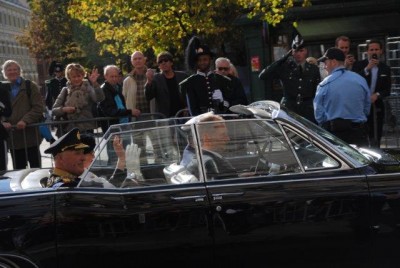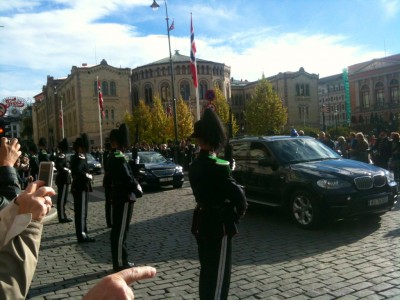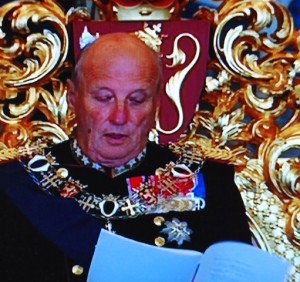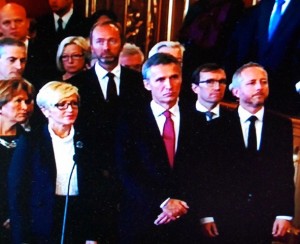Wednesday’s ceremonial opening of the Norwegian Parliament (Stortinget) was full of traditions built up over the past 158 sessions. Royal pomp, fancy dress and uniforms, song and speeches were the order of the day.

Royal guards lined Oslo’s main parade boulevard, Karl Johans gate, which was closed to normal traffic all the way from the Royal Palace to the Parliament. The convoy of cars carrying King Harald V, Queen Sonja, Crown Prince Haakon arrived like clockwork at the Storting, where a welcome delegation headed by Member of Parliament Jan Tore Sanner (likely to become a minister in the incoming Conservatives-led government) escorted the royals into the Storting’s main chamber.
There waited all the new and returning MPs, senior bureaucrats, foreign diplomats and the press corps, many dressed in formal national costumes known as the bunad. It’s the one day of the year when MPs are allowed to invite family members, and the new President of the Parliament, bunad-clad Olemic (pronounced “Olie-mick´”) Thommessen, told state broadcaster NRK that he’d invited his mother.

Opening day at the Parliament is also one of the few occasions when all facets of the state power structure are gathered in one place: Members of Parliament, government ministers, the royals and Supreme Court justices. The highest officials of the military and the bureaucracy are also invited.
The program, in accordance with the constitution, starts with the monarch reading a statement of the government’s intentions called the trontale, or speech from the throne, even though King Harald read it aloud standing up, with everyone else standing as well. This year’s was the last one to be presented to the king for reading by outgoing Labour Prime Minister Jens Stoltenberg, who’s held government power for the past eight years but lost it in the September 9 election.

The speech lays out detailed plans that the government has for the year ahead, even though they may be moot since Stoltenberg is about to be replaced as prime minister by the leader of the Conservative Party, Erna Solberg. Torbjørn Røe Isaksen, a prominent member of the Conservatives who also may become a new government minister, graciously said later, though, that “a lot of what we heard in the speech may in fact be carried out” after all, with both the outgoing and incoming governments in favour of programs, for example, to keep Norway’s economy strong and to improve roads. “There’s a lot we actually agree on,” Isaksen told NRK, suggesting that there may not be as many radical differences under the new government as some might expect.
The ceremonial opening illustrated the traditions that most everyone in Parliament adhere to regardless of political persuasion, from having the youngest member of the government follow the king’s speech by reading aloud the government’s “state of the nation” address, to all the bowing and curtsying going on. Thommessen also made some traditional remarks and then nearly everyone sang “God Save the King” and Norway’s national anthem, Ja vi elsker (Yes we love this country…)

After that, the MPs remained in place until the monarch had actually left the building, also in accordance with the constitution, which states that parliament can’t handle any matters in the monarch’s presence. As soon as he’d left, driving in an open car back to the palace, both speeches were formally accepted and the session adjourned.
The real work won’t get underway until next week, after new parliamentary committees are in place and the state budget presented. Stoltenberg, meanwhile, paved the way for his government’s resignation by stressing what good shape Norway is in before the next government takes over. The economy remains strong, employment is high and unemployment low and Norway continues to rank as one of the world’s best countries in which to live. Spirits and humour seemed high all around, with opposition politicians promising to be “constructive” and Stoltenberg claiming that he’s looking forward to his new position among them.
“I would have gladly continued as prime minster,” he told NRK, “but it’s no small job to be the parliamentary leader for the largest party in opposition either.” His government is expected to formally resign after presenting its last state budget on Monday, with Solberg’s government due to take over by October 18.
newsinenglish.no/Nina Berglund

